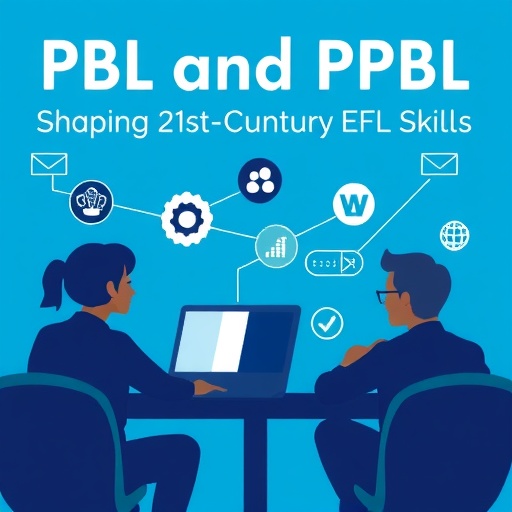In the evolving landscape of education, the methodologies employed to deliver knowledge are undergoing significant transformation. A recent study by Jelodari, Zenouzagh, and Hashamdar emphasizes the importance of Project-Based Learning (PBL) and its electronic variant, e-PBL, particularly within the context of English as a Foreign Language (EFL) education. This research highlights how these pedagogical approaches are essential for equipping learners with 21st-century skills—critical thinking, collaboration, and digital literacy—that are increasingly demanded in a rapidly changing world.
Traditionally, language acquisition relied heavily on rote memorization and grammar-focused instruction. However, the research suggests that such methods fall short in fostering the critical competencies needed for today’s globalized society. By embracing PBL, educators can facilitate a more dynamic learning environment where students engage in real-world problems, allowing them to apply their language skills practically and creatively.
The study underscores the need for teachers to incorporate PBL strategies to enhance student engagement. Through project-based activities, students are tasked with solving meaningful challenges, which encourages them to communicate effectively, think analytically, and collaborate with others. The research reveals how this approach not only boosts language proficiency but also empowers learners to take ownership of their educational journey, ultimately leading to increased motivation and retention of knowledge.
Moreover, the advent of technology has brought about the rise of e-PBL, which utilizes digital platforms and resources to further enrich the learning experience. This virtual approach offers flexibility and accessibility, allowing learners to collaborate with peers across the globe, share ideas, and engage with diverse perspectives. In an era marked by rapid technological advancements, e-PBL equips students with the necessary skills to navigate digital environments—an indispensable competency in today’s workplace.
The authors of the study conducted a thorough analysis of various PBL and e-PBL implementations across different educational contexts. Their findings indicate a positive correlation between these approaches and the development of critical skills in EFL learners. Students reported increased confidence in their language abilities as they engaged in projects that required authentic communication. This confidence is paramount, as it translates to greater participation in real-life scenarios that demand effective language use.
Furthermore, technology integration within PBL has shown to facilitate a more personalized learning experience. Digital tools enable educators to tailor projects to suit individual student needs, accommodating various learning styles and paces. The researchers suggest that when students feel that their specific interests and abilities are acknowledged, they are more likely to remain engaged and motivated to learn.
The implications of this study extend beyond the classroom. As globalization continues to reshape industries, employers are increasingly seeking individuals who can think critically, work collaboratively, and adapt to new technologies. By adopting PBL and e-PBL methodologies, educators play a crucial role in preparing students for the challenges of the modern workforce. The ability to tackle complex problems and collaborate effectively with others is not just desirable; it is essential for success in any field.
Moreover, the research offers valuable insights for educational policymakers. As school systems around the world strive to develop curriculum frameworks that are relevant to current and future workforce demands, the findings advocate for the integration of PBL and e-PBL into standard language education. By prioritizing these approaches, policymakers can ensure that EFL education not only teaches language mechanics but also cultivates the holistic skill set needed for learners to thrive.
One of the study’s key recommendations is the need for professional development opportunities for teachers. While the benefits of PBL and e-PBL are widely recognized, many educators may feel unprepared to implement these strategies effectively. Ongoing training and resources can empower teachers to harness the potential of these innovative approaches, leading to more impactful learning experiences for students.
In conclusion, the exploration of Project-Based Learning and electronic Project-Based Learning reveals significant implications for EFL education in the 21st century. The study by Jelodari and colleagues serves as a call to action for educators, administrators, and policymakers to reconsider traditional pedagogical practices. By embracing PBL and e-PBL, stakeholders can foster an educational environment that not only enhances language acquisition but also equips students with the essential skills to thrive in a complex, interconnected world.
As we navigate the future of education, the need for adaptive teaching methodologies becomes clearer. The findings from this research reaffirm that PBL and e-PBL are not merely trends but fundamental shifts in how we prepare learners for success. The integration of these practices will undoubtedly reshape the EFL landscape, nurturing a generation of skilled individuals ready to meet the demands of the future.
In this digital age, where collaboration and problem-solving are at the forefront of innovation, embracing these transformative approaches in language education is vital. The time has come for educators to step beyond traditional methods and embrace the challenge of preparing students for a world that is continually evolving.
As we move forward, it will be essential to monitor trends and outcomes associated with PBL and e-PBL in EFL contexts. Future research should continue to explore the long-term effects of these pedagogical strategies, ensuring that the education system adapts to meet the changing needs of society. The journey toward modernizing language education is ongoing, and with sustainable practices in place, the potential for success is limitless.
Subject of Research: Project-Based Learning and e-PBL in EFL Education
Article Title: Exploring PBL and e-PBL: implications for 21st-century skills in EFL education
Article References: Jelodari, Z., Zenouzagh, Z.M. & Hashamdar, M. Exploring PBL and e-PBL: implications for 21st-century skills in EFL education. Discov Educ 4, 311 (2025). https://doi.org/10.1007/s44217-025-00773-3
Image Credits: AI Generated
DOI: 10.1007/s44217-025-00773-3
Keywords: Project-Based Learning, e-PBL, 21st-century skills, EFL education, technology integration, critical thinking, collaboration, digital literacy.




